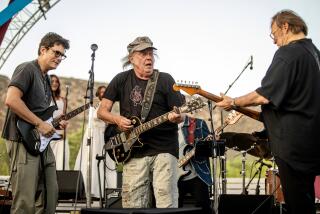POP WEEKEND : David Crosby’s Voice Helps CS&N; Earn Ovations
- Share via
Adoringly nostalgic audiences have let Crosby, Stills & Nash slide by on nights when they sounded as if their ability, enthusiasm and relevance to ‘80s pop were a long time gone.
But ignited by David Crosby’s powerful, assured singing, CS&N; earned their ovations Saturday night at the Pacific Amphitheatre in Costa Mesa and even hinted that they may have something to offer besides memories. Old songs outnumbered new by four to one in a sprawling, 2 1/2-hour concert, but CS&N; and a fine four-man backing band performed with plenty of punch and a surprising sense of fun that kept most of the music fresh.
Crosby was a revelation. The audience showered him with affection for his much-discussed comeback from drug addiction and prison, but his forceful performance stood on its own, without any need of the crutch of sentiment. At several peak moments, Crosby seemed to draw on an unlimited reserve of emotion, confidence and vocal control. The highlights included his two finest oldies: a solo version of “Almost Cut My Hair” and “Long Time Gone,” a tough rocker driven by Joe Vitale’s surging drumming. Crosby also offered a riveting new song, “Monkey and the Underdog,” a gritty, chunky-rhythmed blues-rocker in which, free from self-pity or self-righteousness, he conveyed the difficulty and desperation of his struggle against addiction: “Fighting, fighting just to stay alive/Fighting to get from 4 o’ clock to 5.” The song will be on Crosby’s next solo album.
Not that Crosby was perfect. “Compass,” another song about his struggle to recover from drugs--Crosby said it will appear on the forthcoming Crosby, Stills, Nash & Young album--was heartfelt, but it also was a meandering mess of metaphors. And then there was “Guinnevere,” one of the most dully droning songs of the rock era. CS&N; could profitably have taken an Excalibur to that one and a few other songs in the show’s overlong acoustic midsection.
In CS&N;’s heyday, S was the initial that really counted. Now, Stephen Stills is the member the other two have to carry. Though still a supple and effective guitarist, Stills is hardly a professional caliber singer anymore, let alone a vocalist capable of sustaining ambitious harmonies. His scratchy, hollow husk of a voice was serviceable in some limited settings, including good trio harmonies on “Wind on the Water” and “Find the Cost of Freedom.”
But when Stills tried to stretch his range or embellish a phrasing, he sounded like a victim of attempted strangulation. Luckily, keyboardist Michael Finnigan is a fine singer who took up much of Stills’ slack and allowed CS&N; to maintain a rich vocal blend. By omitting “Suite: Judy Blue Eyes,” CS&N; spared considerable embarrassment for Stills, whose singing has gotten to the point where it’s no fun anymore.
Graham Nash, the between-songs mouthpiece of the band, was a solid utility man who turned in consistently good harmonies as well as a lovely, if slavishly faithful, solo version of Simon & Garfunkel’s “America.” He also debuted a new ballad, “Lasting Love,” that overcame lyrical cliches with a pretty melody and a sincere expression of vulnerability.
Nash has a schoolmarmish side and an annoying tendency to be a self-congratulatory cheerleader for the band and its audience. Crosby offset that with an easygoing, affably humorous manner that seemed to help loosen up his partner a bit. An unexpected sight gag showed that CS&N; still know how to have a good time together: Just as Nash was singing reverent lines about Stonehenge during the song “Cathedral,” a model of a Stonehenge ruin drifted down from the rafters and settled on the unsuspecting Nash’s grand piano. Nash cracked up with laughter and crawled behind his piano bench as a delighted Stills capered across the stage.
Is that any way for august folk-rock icons to behave? Yes, indeed.
More to Read
The biggest entertainment stories
Get our big stories about Hollywood, film, television, music, arts, culture and more right in your inbox as soon as they publish.
You may occasionally receive promotional content from the Los Angeles Times.











